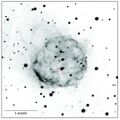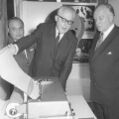Template:On This Day (nonfiction)/March 11
1437: Korean astronomers record the appearance of a new star, which shines for fourteen days before dimming. This astronomical event will later be known as Nova Scorpii AD 1437.
1811: Mathematician and astronomer Urbain Le Verrier born. Le Verrier will predict the existence and position of Neptune using only mathematics, an event which will be widely regarded as one of the most remarkable moments of 19th century science.
1822: Mathematician, economist, and academic Joseph Louis François Bertrand born. Bertrand will contribute to number theory, differential geometry, probability theory, economics and thermodynamics.
1880: American eugenicist and sociologist Harry H. Laughlin born. Laughlin will be the Superintendent of the Eugenics Record Office from its inception in 1910 to its closing in 1939, and among the most active individuals in influencing American eugenics policy, especially compulsory sterilization legislation.
1890: Engineer and academic Vannevar Bush born. Bush develop the Differential Analyzer, initiate the Manhattan Project and oversee government mobilization of scientific research during World War II, and make pioneering contributions to computer science.
1955: Biologist, pharmacologist, and botanist Alexander Fleming dies. Fleming discovered the enzyme lysozyme in 1923, and the world's first broadly effective antibiotic substance benzylpenicillin (Penicillin G) in 1928, for which he shared the Nobel Prize in Physiology or Medicine in 1945 with Howard Florey and Ernst Boris Chain.
1971: Inventor Philo Farnsworth dies. Farnsworth made pioneering contributions to the development of all-electronic television.
1996: Engineer and inventor Charles William Oatley dies. Oatley developed of one of the first commercial scanning electron microscopes.
2002: Inventor and engineer Rudolf Hell dies. Hell invented the Hellschreiber, a pioneering teleprinter system. Shown here: Hell's Wetterkartenschreiber ("weather chart recorder").









